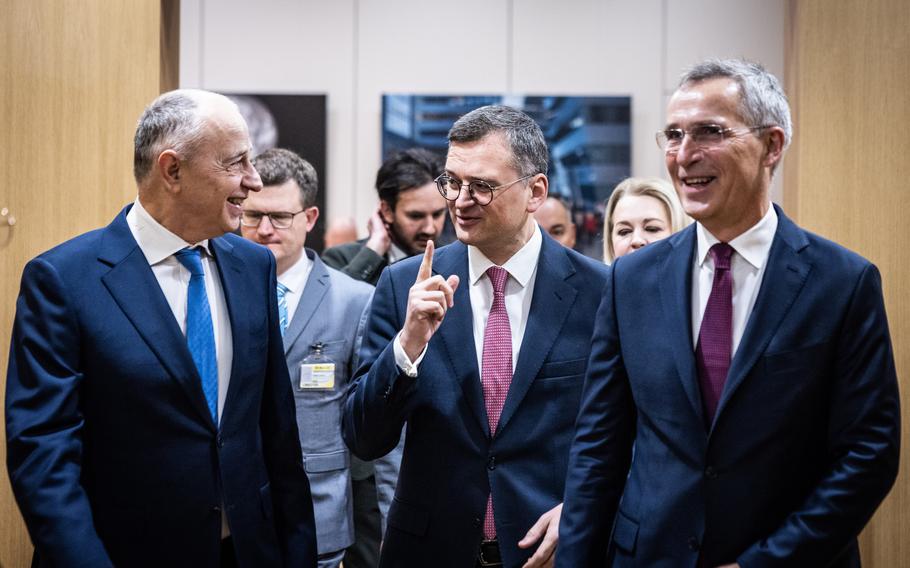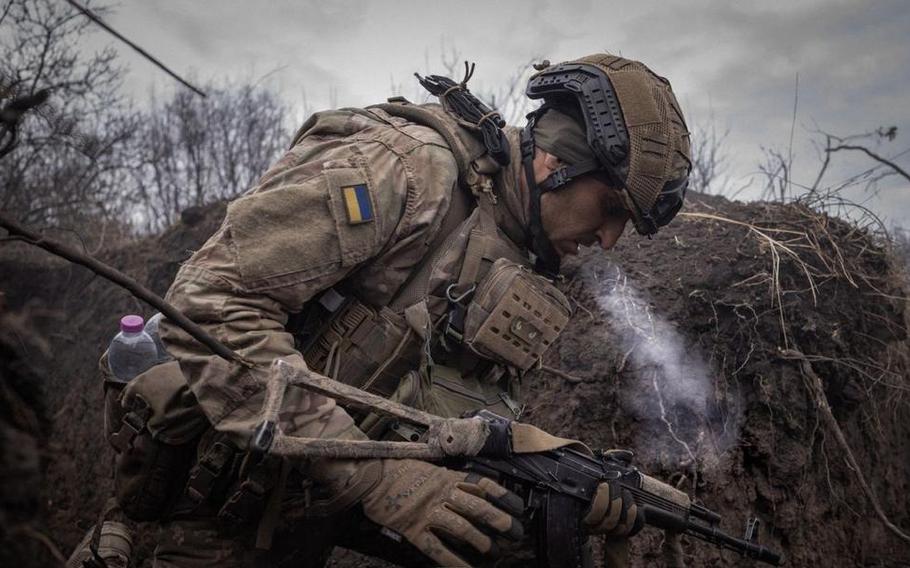
From left, NATO Deputy Secretary-General Mircea Geoana and Ukrainian Foreign Minister Dmytro Kuleba walk with NATO Secretary-General Jens Stoltenberg during talks in Brussels, Nov. 29, 2023. Stoltenberg said the alliance has given a series of recommendations to Ukraine on reforms needed as prerequisites for being accepted into the alliance. (NATO)
Ukraine’s armed forces have become the strongest in Europe and now function as a “de facto NATO army,” the country’s top diplomat said Wednesday in Brussels, where discussions about alliance membership for Ukraine were on the table.
Ukraine Foreign Minster Dmytro Kuleba also said the rest of Europe is now dependent to some degree on Ukraine for its own security.
“Defending Europe without Ukraine is a futile task; you cannot do it for one simple reason — we have the strongest, most battle-hardened army in Europe,” Kuleba said.
Kuleba’s comments came during a gathering of the newly formed NATO-Ukraine Council, established earlier this year to give Kyiv a stronger voice with its partners in the trans-Atlantic alliance. One of the issues at the top of the group’s agenda is fine-tuning the way ahead for Ukraine to become a NATO member. Allies have long pledged to do that, but without any timeline for making it a reality.
“We remain unwavering in our commitment to Ukraine,” NATO Secretary-General Jens Stoltenberg said Wednesday. “We are determined that Ukraine will one day sit at this table as a full member of our alliance.”
Stoltenberg said NATO has given Ukraine a series of recommendations on needed reforms that must be made before accession, which include ways to eliminate government corruption.

A Ukrainian soldier assigned to the 93rd Mechanized Brigade checks his weapon in an undated photo shared by Ukraine's Defense Ministry on Nov. 27, 2023. During meetings Nov. 29 in Brussels, Ukrainian Foreign Minster Dmytro Kuleba highlighted his country's importance to Europe's defense, due to the military's combat experience. (Ukraine Defense Ministry/X)
Besides Ukraine’s prospective membership, allies discussed how to further support Kyiv in its war with Russia.
In Brussels, allies insisted they were with Ukraine for the long-haul and that military support to the country will continue to flow.
“Some are questioning whether the United States and other NATO allies should continue to stand with Ukraine as we enter the second winter of Putin’s brutality,” U.S. Secretary of State Antony Blinken said at the end of talks in Brussels. “But the answer here today at NATO is clear and it is unwavering. We must and we will continue to support Ukraine.”
Still, concerns are growing about the West’s political will to keep up the same level of support that has empowered Ukraine’s military since Russia’s Feb. 2022 invasion.
In Washington, there is disagreement in Congress about the scale of support that should be given, with some Republican House lawmakers wanting to cut off all military aid. And in Europe, depleted ammunition stockpiles are challenging the ability of militaries to keep the firepower flowing.
Kuleba and NATO officials said ramping up ammunition and weapons production capacity is critical.
At the same time, the Russian economy is now on a “war footing” despite facing various economic challenges, Stoltenberg said.
Russian President Vladimir Putin “has a high tolerance for casualties and Russian aims in Ukraine have not changed,” he said. “Russia has amassed a large missile stockpile ahead of winter.”
Meanwhile, questions about whether the time has come for peace talks and even territorial concessions have begun to percolate amid a virtual stalemate.
One idea that has been circulated to end the war is for Ukraine to surrender some of its land to Russia in exchange for NATO membership, and the security guarantees that would come with whatever Ukrainian territory remained.
Kuleba, when asked about such a proposal, shot the idea down.
“These people should suggest this to their own government, to give up their territory, to give up their people,” Kuleba said. “And if they do so, then I am ready to listen to their arguments.”
Meanwhile, Putin last week reportedly signaled he was open to peace talks during a virtual meeting of the G20 nations.
“We must think about how to stop this tragedy,” said Putin, as quoted by Russian state media.
Since the start of the war, both Russia and Ukraine have suffered many casualties, with some high-end estimates of about 70,000 Ukrainians and well over 100,000 Russians killed in action.
Stoltenberg on Wednesday said Russia’s total of those killed and wounded stands at about 300,000 troops.